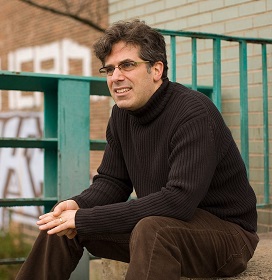De Amerikaanse schrijver Jonathan Allen Lethem werd geboren op 19 februari 1964 in Brooklyn, New York. Lethem groeide aanvankelijk op in Kansas City, vervolgens in Brooklyn. Zijn vader Richard Brown Lethem is beeldend kunstenaar, zijn moeder Judith stierf aan kanker toen hij nog een tiener was. Een paar semesters studeerde Lethem met Bret Easton Ellis aan het Bennington College in Vermont voordat hij naar Californië verhuisde en begon te schrijven. Eind jaren tachtig publiceerde hij zijn eerste korte verhalen, maar pas met zijn romans trok hij in de jaren negentig internationaal de aandacht. Met zijn roman „Gun, with Occasional Music“, een futuristische detective verhaal in de stijl van Raymond Chandler won hij in 1995 de Locus Award in de categorie “Best First Novel” van Locus Magazine. Na het uitbrengen van zijn vroege verhalen in één bunde,l “The Wall of the Sky, the wall of the Eye”, verscheen in 1996 Lethem’s roman “As She Climbed Across the Table”. In 1997 ontving hij de World Fantasy Award voor “The Wall of the Sky, the wall of the Eye”. Eind jaren negentig verhuisde Lethem van de Bay Area terug naar Brooklyn. Zijn volgende boek na deze verhuizing was “Girl in Landscape“ (1998). In 1999 verscheen “Motherless Brooklyn”. Voor deze roman ontving Lethem de National Book Critics Circle Award, de Macallan Gold Dagger Awards for crime fiction, de Salon.com Book Prize en was het Esquire Book of the Year. In 2003 publiceerde Lethem de autobiografisch geïnspireerde educatieve roman “The Fortress of Solitude” Zijn tweede verhalenbundel: “Mannen Cartoons” verscheen in 2004. Weer een roman “You do not love me yet” verscheen in 2007. In 1987 trouwde Jonathan Lethem met schrijfster Shelley Jackson, maar ze gingen in 1998 weer uit elkaar. Lethem woonde tot 2010 in Brooklyn toen hij vanwege familiale redenen naar Claremont, Californië verhuisde. Daar doceert hij creatief schrijven aan het Pomona College.
Uit: Motherless Brooklyn
“Maufishful,” said Gilbert Coney in response to my outburst, not even turning his head. I could barely make out the words–“My mouth is full”–both truthful and a joke, lame. Accustomed to my verbal ticcing, he didn’t usually bother to comment. Now he nudged the bag of White Castles in my direction on the car seat, crinkling the paper. “Stuffinyahole.”
Coney didn’t rate any special consideration from me. “Eatmeeatmeeatme,” I shrieked again, letting off more of the pressure in my head. Then I was able to concentrate. I helped myself to one of the tiny burgers. Unwrapping it, I lifted the top of the bun to examine the grid of holes in the patty, the slime of glistening cubed onions. This was another compulsion. I always had to look inside a White Castle, to appreciate the contrast of machine-tooled burger and nubbin of fried goo. kaos and control. Then I did more or less as Gilbert had suggested–pushed it into my mouth whole. The ancient slogan Buy ‘em by the sack humming deep in my head, jaw working to grind the slider into swallowable chunks, I turned back to stare out the window at the house.
Food really mellows me out.
We were putting a stakeout on 109 East Eighty-fourth Street, a lone town house pinned between giant doorman apartment buildings, in and out of the foyers of which bicycle deliverymen with bags of hot Chinese flitted like tired moths in the fading November light. It was dinner hour in Yorktown. Gilbert Coney and I had done our part to join the feast, detouring up into Spanish Harlem for the burgers. There’s only one White Castle left in Manhattan, on East 103rd. It’s not as good as some of the suburban outlets. You can’t watch them prepare your order anymore, and to tell the truth I’ve begun to wonder if they’re microwaving the buns instead of steaming them. Alas. Taking our boodle of thusly compromised sliders and fries back downtown, we double-parked in front of the target address until a spot opened up. It only took a couple of minutes, though by that time the doormen on either side had made us–made us as out-of-place and nosy anyway. We were driving the Lincoln, which didn’t have the “T”-series license plates or stickers or anything else to identify it as a Car Service vehicle. And we were large men, me and Gilbert. They probably thought we were cops. It didn’t matter. We chowed and watched.”

Jonathan Lethem (New York, 19 februari 1964)
